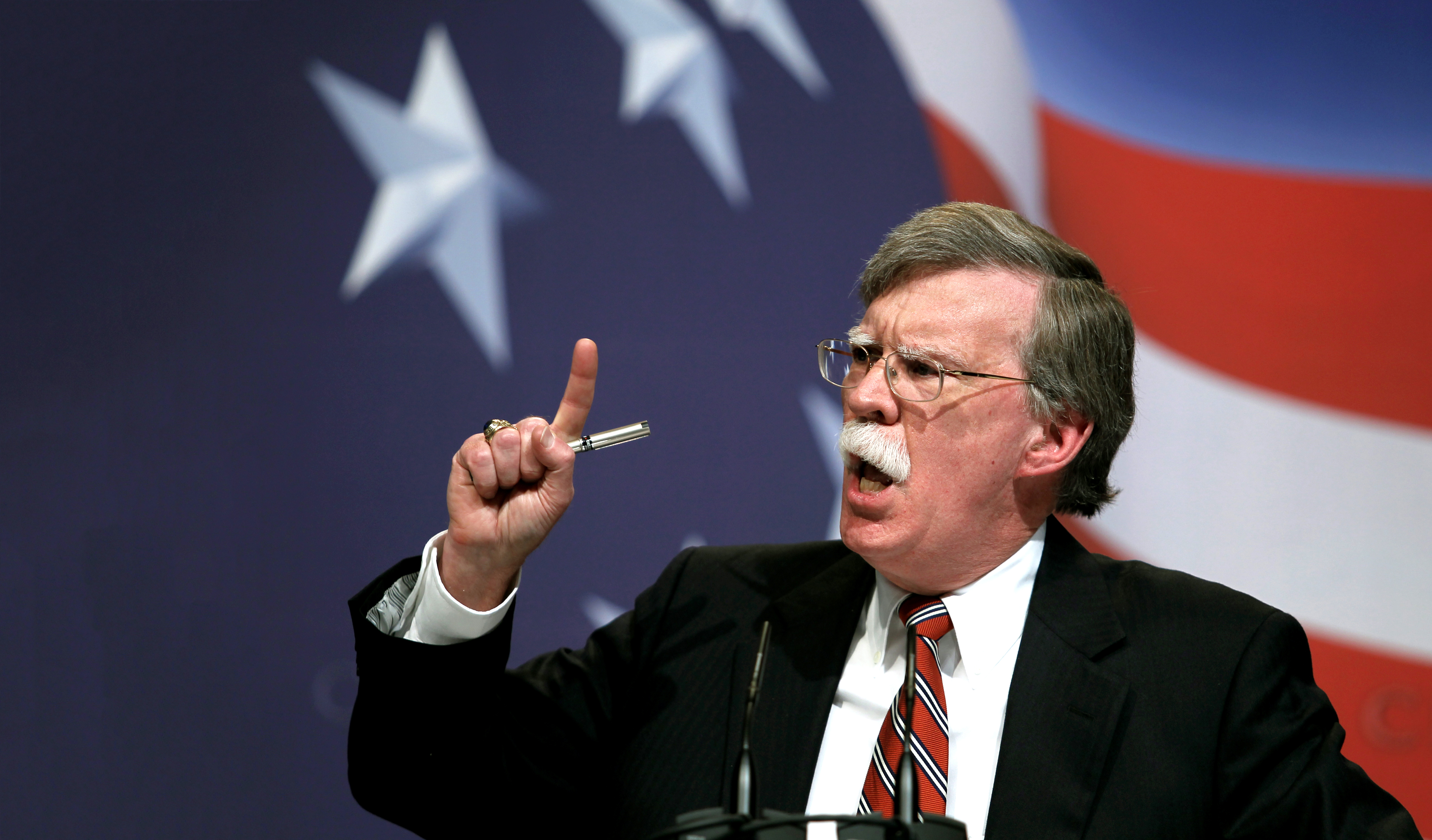President Trump is making this warmongering lunatic his national security adviser
Please, let's not forget what a dangerous nut John Bolton is


John Bolton will be succeeding H.R. McMaster to become President Trump's national security adviser. This should send a chill down the spines of every American — and indeed of every person on the planet.
In a country with a less bellicose foreign policy establishment, Bolton would be considered a warmongering lunatic. But America's foreign policy establishment inclines toward reflexive militarism (on the grounds that American bombs, troops, and special operations forces are invariably a force for good in the world), and so Bolton comes off as merely somewhat more unhinged than his peers. But that shouldn't blind us to the enormous danger confronting us all now that he's ascended to such a powerful position in the Trump administration.
Bolton thinks that war — by which I mean everything from the launching of missiles to the deployment of ground forces to foreign theaters of battle — is the solution to every problem the United States confronts in the world. That is not an exaggeration. I challenge readers to find any statement Bolton has made against any American act of war at any time anywhere. And no, Bolton's harsh words for the Obama administration's plans for a limited air strike against Syria in retaliation for Bashar al-Assad's use of chemical weapons in the country's civil war doesn't count, since the criticism amounted to the argument that the bombing would be too limited in scope.
Subscribe to The Week
Escape your echo chamber. Get the facts behind the news, plus analysis from multiple perspectives.

Sign up for The Week's Free Newsletters
From our morning news briefing to a weekly Good News Newsletter, get the best of The Week delivered directly to your inbox.
From our morning news briefing to a weekly Good News Newsletter, get the best of The Week delivered directly to your inbox.
The pattern goes all the way back to the Vietnam War, which Bolton supported as a young man (while personally avoiding deployment to Southeast Asia by joining the Maryland National Guard). Like most Republicans, he supported Ronald Reagan's confrontational stance against the Soviet Union and George H.W. Bush's Persian Gulf War to turn back Iraq's invasion of Kuwait. During the Clinton administration, he advocated military interventions in the Balkans and the use of force to topple Saddam Hussein. He strongly advocated for the wars in Afghanistan and Iraq, and as recently as 2015 defended the latter as the "correct" decision, despite our failure to find the weapons of mass destruction that were Bolton's primary reason for supporting the war in the first place.
Along the way, he also tried to assimilate Cuba into the "axis of evil" by accusing the country (on the basis of intelligence that was later debunked) of developing biological weapons and distributing them to Libya and Syria. He later advocated the targeted assassination of Libya's Moammar Gadhafi and then backed the Obama administration's military intervention there (which of course didn't stop him from blasting the Libyan action after it had devolved into Iraq-like chaos as "too little, too late"). He thinks the U.S. should have invaded Syria and overthrown Assad shortly after the Iraq invasion of 2003, just as he's made clear over and over again that he thinks it would be a splendid idea for the U.S to bomb Iran — and perhaps even a good thing for Israel to launch a preemptive nuclear strike against the country.
And then there's North Korea, one of the biggest problems confronting the Trump administration and the world. It will surprise no one that Bolton favors a massive preemptive strike against the country — or that he waves away concerns about the potential for massive casualties and the possible negative consequences for America's strategic interests throughout the region. We would simply ask for China's help in bringing about a "controlled collapse of the North Korean regime." Sure the costs could be enormous. But for Bolton, the costs of avoiding war would clearly be greater.
This is what defines Bolton's foreign policy thinking: the conviction that war is always the best option.
Having a man who so consistently — one might almost say instinctually — favors military action serving as the national security adviser to the president would be dangerous in any White House. But in the Trump administration it could be catastrophic.
Trump is utterly ignorant of the world, prone to making impulsive decisions, and tends to defer to the most forceful voice in the room, especially when it conveys information with confident bluster. That would give Bolton enormous power to shape policy — which means the power to get the United States to launch big new wars as well as expand the numerous ones we're already waging across wide swaths of the Middle East, Africa, and South Asia.
One of those wars (in Iraq) was launched by another president lacking foreign policy experience who deferred to the hawks in the room (Dick Cheney, Donald Rumsfeld), who combined paranoia about threats with absurdly optimistic prognostications about the efficacy of using American bombs to shape the future course of the region. It ended up destabilizing much of the Middle East.
Eight years later another inexperienced president deferred to his hawkish advisers (Hillary Clinton, Susan Rice, Samantha Powers) in launching another war (in Libya) on the basis of an overly sanguine assessment of the likely consequences. It ended up destabilizing much of North Africa.
Both acts of destabilization have led to enormous refugee flows from those areas of the world to Europe, where they have helped to provoke a right-wing populist-nationalist reaction that is transforming politics in an anti-liberal direction across the European Union.
Are we really supposed to believe that the results of putting John Bolton in a senior advisory position from which he could persuade President Trump to launch wars against North Korea and Iran would have less disastrous consequences for the United States and the world? If the stakes weren't so high, the suggestion might be considered a punchline.
The position of national security adviser isn't confirmable by the Senate, so there may be nothing that Congress can do formally to stand in the way of Bolton taking office on April 9. But that doesn't mean that Congress, or the public, should be silent. On the contrary, between now and then the president needs to hear in no uncertain terms from people he respects in his own party that Bolton is bad news. There may be some small chance that Trump could change his mind.
The alternative could be the very worst news for the rest of us.
Editor's note: This article was originally published on March 8, 2018. It was updated on March 23, 2018.
A free daily email with the biggest news stories of the day – and the best features from TheWeek.com
Damon Linker is a senior correspondent at TheWeek.com. He is also a former contributing editor at The New Republic and the author of The Theocons and The Religious Test.
-
 The last words and final moments of 40 presidents
The last words and final moments of 40 presidentsThe Explainer Some are eloquent quotes worthy of the holders of the highest office in the nation, and others... aren't
-
 The JFK files: the truth at last?
The JFK files: the truth at last?In The Spotlight More than 64,000 previously classified documents relating the 1963 assassination of John F. Kennedy have been released by the Trump administration
-
 'Seriously, not literally': how should the world take Donald Trump?
'Seriously, not literally': how should the world take Donald Trump?Today's big question White House rhetoric and reality look likely to become increasingly blurred
-
 Will Trump's 'madman' strategy pay off?
Will Trump's 'madman' strategy pay off?Today's Big Question Incoming US president likes to seem unpredictable but, this time round, world leaders could be wise to his playbook
-
 Democrats vs. Republicans: which party are the billionaires backing?
Democrats vs. Republicans: which party are the billionaires backing?The Explainer Younger tech titans join 'boys' club throwing money and support' behind President Trump, while older plutocrats quietly rebuke new administration
-
 US election: where things stand with one week to go
US election: where things stand with one week to goThe Explainer Harris' lead in the polls has been narrowing in Trump's favour, but her campaign remains 'cautiously optimistic'
-
 Is Trump okay?
Is Trump okay?Today's Big Question Former president's mental fitness and alleged cognitive decline firmly back in the spotlight after 'bizarre' town hall event
-
 The life and times of Kamala Harris
The life and times of Kamala HarrisThe Explainer The vice-president is narrowly leading the race to become the next US president. How did she get to where she is now?



